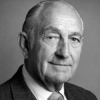David Packard

David Packard
David Packardwas an electrical engineer and co-founder, with William Hewlett, of Hewlett-Packard, serving as president, CEO, and Chairman of the Board. He served as U.S. Deputy Secretary of Defense from 1969 to 1971 during the Nixon administration. Packard served as President of the Uniformed Services University of the Health Sciencesfrom 1976 to 1981. He was also chairman of the Board of Regents from 1973 to 1982. Packard was the recipient of the Presidential Medal of Freedom in 1988 and is...
NationalityAmerican
ProfessionEntrepreneur
Date of Birth7 September 1912
CountryUnited States of America
A company has a greater responsibility than making money for its stockholders. We have a responsibility to our employees to recognize their dignity as human beings.
Bill Hewlett and I were brought up in the Depression. We weren't interested in the idea of making any money. Our idea was if you couldn't find a job, you'd make one for yourself.
I have observed that money left without special guidance is sometimes used well and sometimes not.
The most important question we have to deal with is a combination of population control and the control of our environment - how to utilize the world in as effective a way as we can for the future of mankind.
You appear to have a good project... we wish you well in this endeavor.
I think that we must find some way to get more common sense, more rationality, in our decisions and less emotion.
Lew was such a straightforward and honest guy. The employees loved him.
The betterment of society is not a job to be left to a few. It's a responsibility to be shared by all.
More organizations die of indigestion than starvation
To remain static is to lose ground.
Profit is not the proper end and aim of management - it is what makes all of the proper ends and aims possible
The greatest success goes to the person who is not afraid to fail in front of even the largest audience.
Management by Walking Around
People, materials, facilities, money, and time are the resources available to us for conducting our business. By applying our skills, we turn these resources into useful products and services. If we do a good job, customers pay us more for our products than the sum of our costs in producing and distributing them. This difference, our profit, represents the value we add to the resources we utilize.